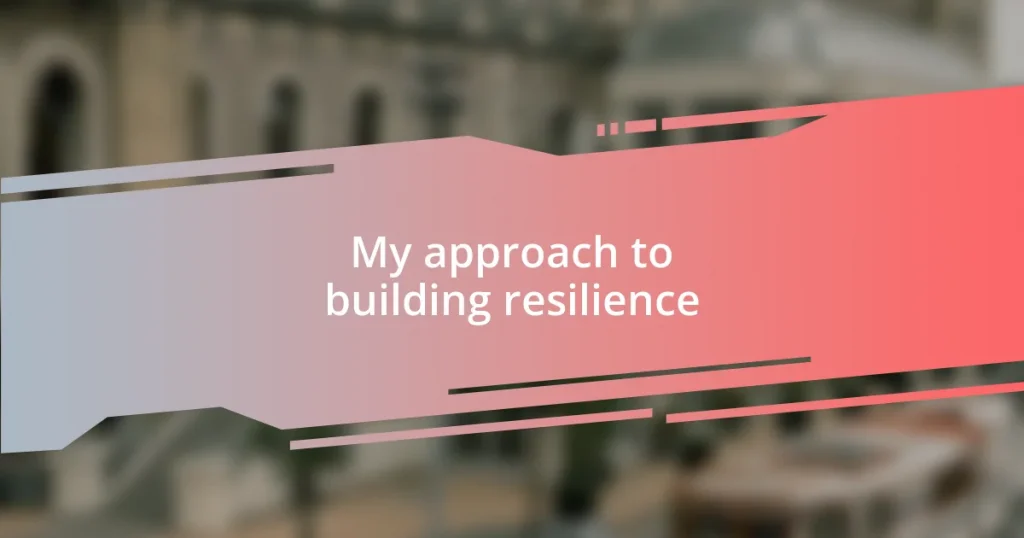Key takeaways:
- Resilience is developed by embracing adversity, focusing on emotional awareness, and transforming challenges into opportunities for growth.
- Key characteristics of resilient individuals include adaptability, optimism, emotional regulation, strong social support, and effective problem-solving skills.
- Practical strategies for building resilience include practicing mindfulness, setting realistic goals, and nurturing social connections, all of which contribute to enhanced coping abilities during difficult times.
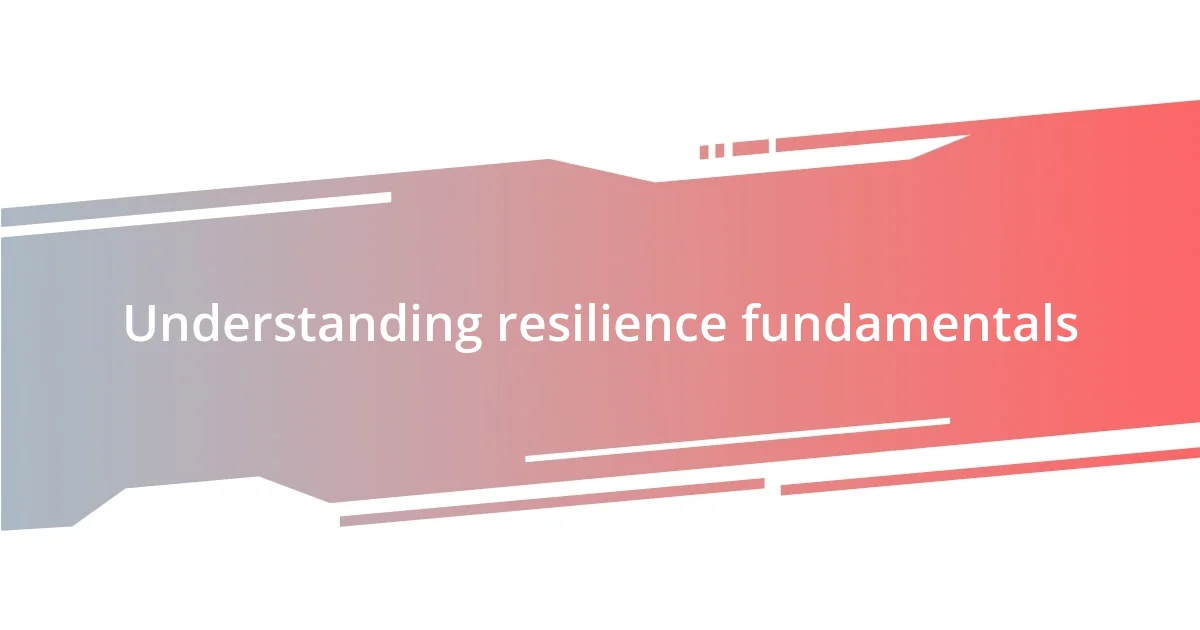
Understanding resilience fundamentals
Resilience, at its core, is the ability to bounce back from adversity. I remember a time when I faced a significant setback at work; it felt like the walls were closing in. In those moments, I often asked myself, “What can I learn from this experience?” This shift in mindset is critical in reshaping our view of challenges, transforming them into opportunities for growth.
To truly understand resilience, it’s essential to recognize that it’s not about avoiding difficulties but rather embracing them. I’ve found that when I faced my fears head-on, whether in personal relationships or career challenges, I not only survived but thrived. It’s fascinating how engaging with our discomfort can be the catalyst for developing a strong support system—both internally and externally.
Emotional awareness is another fundamental aspect. I once journaled through a particularly tough period in my life, pouring my thoughts onto the page. This exercise helped me identify patterns in my emotional responses, which ultimately guided me in managing stress more effectively. Have you ever considered how understanding your emotions can pave the way for resilience? It’s a journey of self-discovery that yields invaluable insights, turning every setback into a stepping stone.
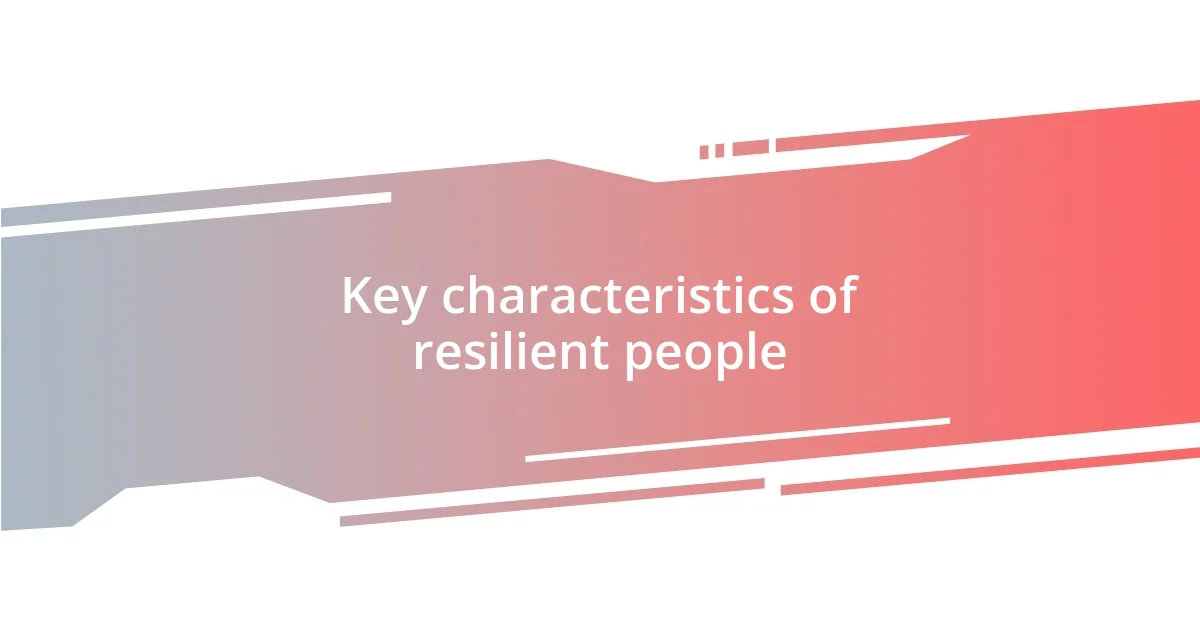
Key characteristics of resilient people
Resilient individuals share certain traits that enable them to navigate through life’s storms effectively. For instance, I’ve noticed that a strong sense of purpose often drives them. During a challenging phase in my career, focusing on my long-term goals helped me rally my energies, pushing through obstacles that seemed insurmountable in the moment. This clarity of purpose not only instilled motivation but also offered a sense of direction.
Here are key characteristics that I’ve observed in resilient people:
- Adaptability: They adjust their plans and actions based on changing circumstances.
- Optimism: They maintain a positive outlook, often finding silver linings in tough situations.
- Emotional regulation: They can manage their emotions effectively, reframing negative thoughts to foster resilience.
- Social support: They actively seek and nurture relationships, understanding the power of community.
- Problem-solving skills: They approach challenges with a mindset geared towards finding solutions rather than getting stuck on problems.
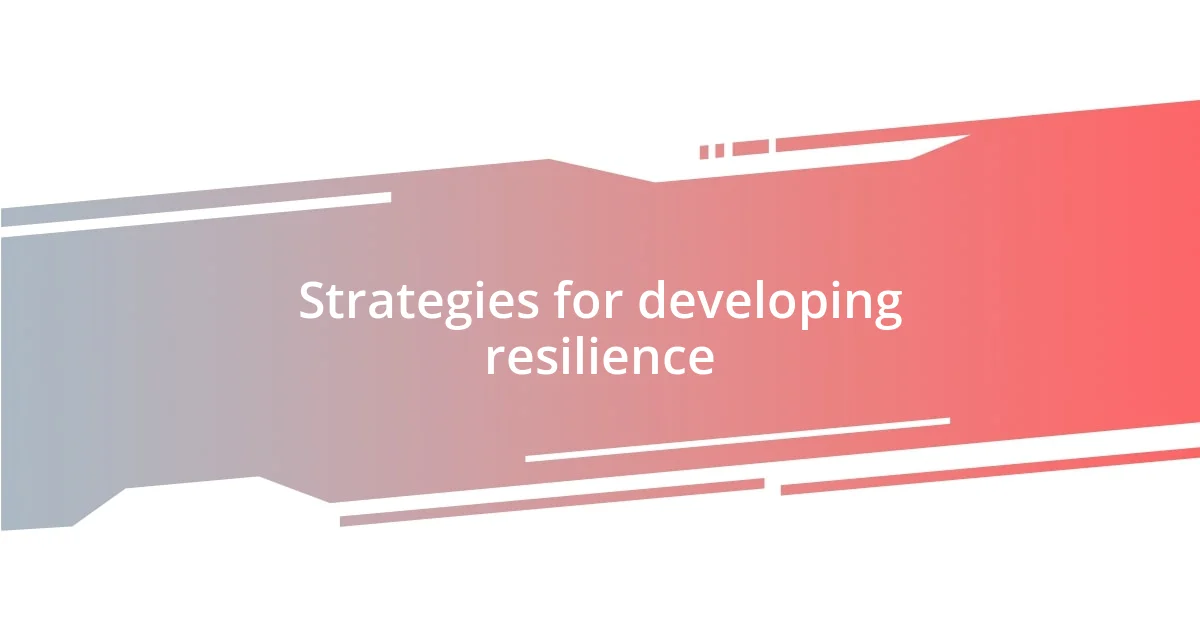
Strategies for developing resilience
Developing resilience is a journey filled with practical strategies that can significantly enhance our ability to cope with adversity. One powerful technique I’ve embraced is mindfulness. During a particularly stressful period, I spent quiet moments focusing on my breath, which helped ground me in the present and reduced overwhelming thoughts. This practice not only calmed my mind but also allowed me to respond rather than react to challenges, fostering a sense of control that is essential for resilience.
Another strategy that stands out is setting realistic goals. I recall a time when I faced numerous obstacles while trying to launch a project. Instead of feeling disheartened, I broke down the larger goal into smaller, achievable tasks. Celebrating those small wins kept my motivation alive and built confidence in my abilities. It’s amazing how these manageable steps can reinforce our belief in ourselves as resilient individuals.
Social connections play an undeniable role in building resilience too. I’ve always found strength in the support of my friends and family, especially during difficult times. Having a trusted circle to share feelings with reminds me that I’m not alone in my struggles. What about you? Have you experienced how simply reaching out to someone can lift your spirits? These connections not only provide comfort but also encourage healthy coping strategies, fortifying our resilience.
| Strategy | Description |
|---|---|
| Mindfulness | A practice that helps ground us in the present, reducing stress and cultivating emotional control. |
| Setting Realistic Goals | Breaking down larger objectives into smaller, achievable tasks to maintain motivation and build self-confidence. |
| Social Connections | Nurturing relationships that provide support, comfort, and encouragement during challenging times. |
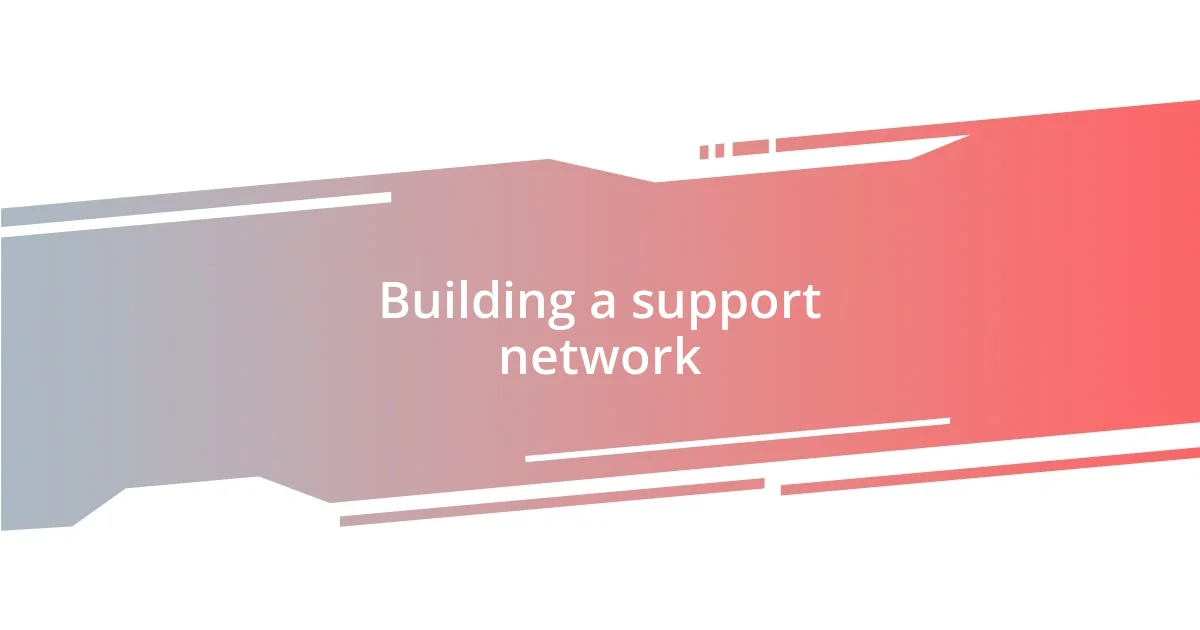
Building a support network
Building a support network has been one of the most impactful choices I’ve made in my life. I remember a time when I faced significant personal challenges and felt overwhelmed. It was during this period that reaching out to friends and family transformed my experience. Their encouragement not only provided comfort but also reminded me that I wasn’t alone. I often wonder, how many people miss out on this vital resource because they hesitate to connect?
When I think about my support network, I see it as a tapestry woven from different threads of friendship and community. Each individual contributes their unique perspectives and strengths, and I’ve found that diverse connections offer insights I might not have considered. For instance, having a friend who is a great listener can make all the difference when I’m struggling with my thoughts. I sometimes ask myself, how can we harness the power of these connections to bolster our resilience even further?
Building and maintaining these relationships requires effort, but the rewards are immense. I know firsthand that just a simple text or a coffee catch-up can lighten the burden of stress. There’s something comforting about voicing my struggles, knowing that there’s someone ready to lend an ear. Can you recall a moment when sharing your feelings lifted some weight off your shoulders? These exchanges not only strengthen our ties but also fortify our ability to face adversity, knitting us closer together in life’s challenging moments.
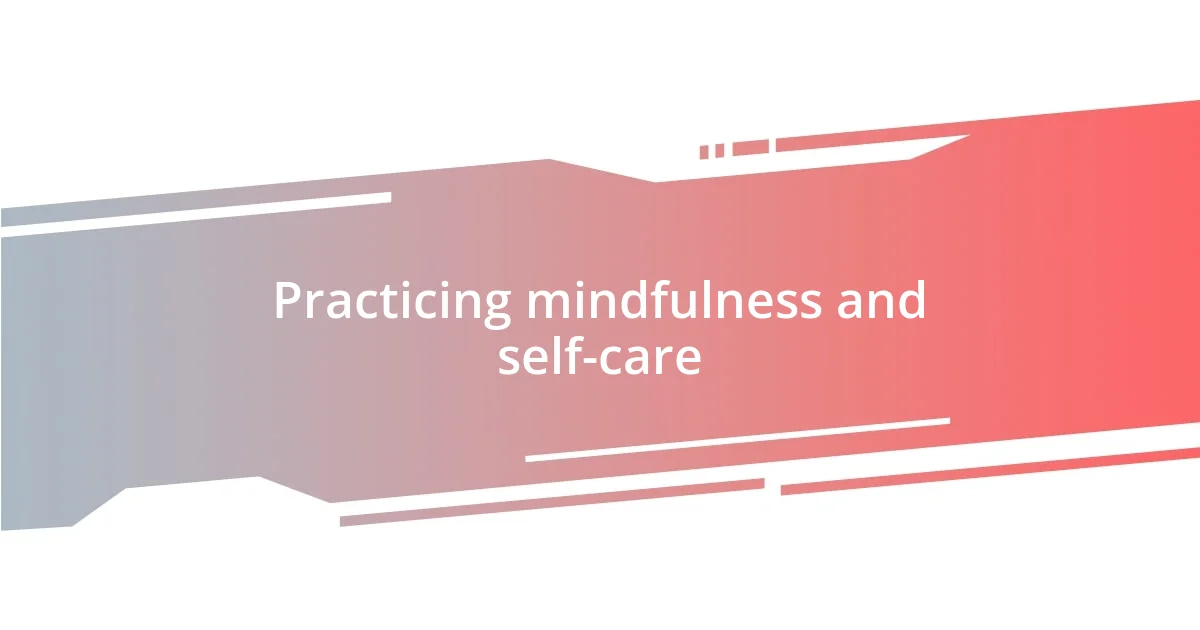
Practicing mindfulness and self-care
Practicing mindfulness has profoundly transformed my approach to life’s challenges. Just the other day, I found myself feeling anxious about a looming deadline. I took a few moments to sit quietly, close my eyes, and focus on my breathing. This simple act cleared my mind and allowed me to see the situation more clearly. Have you ever paused to realize just how much a few conscious breaths can shift your mindset?
Self-care, much like mindfulness, has become a non-negotiable part of my routine. Recently, I prioritized a consistent sleep schedule, which has done wonders for my mood and energy levels. It’s funny, but I used to think juggling responsibilities meant sacrificing my well-being. Now, I understand that nurturing myself first enables me to tackle challenges more effectively. What if we viewed self-care not as a luxury but as a necessity for resilience?
Incorporating mindfulness and self-care into daily life isn’t always easy, but small steps lead to big changes. I often enjoy a leisurely walk in nature, disconnecting from my devices and immersing myself in the sights and sounds around me. There’s a certain magic in these moments; I feel more alive and in tune with myself. How does nature inspire you to recharge and find your inner strength? These practices remind me that resilience isn’t merely about bouncing back but flourishing through intentional acts of self-love.
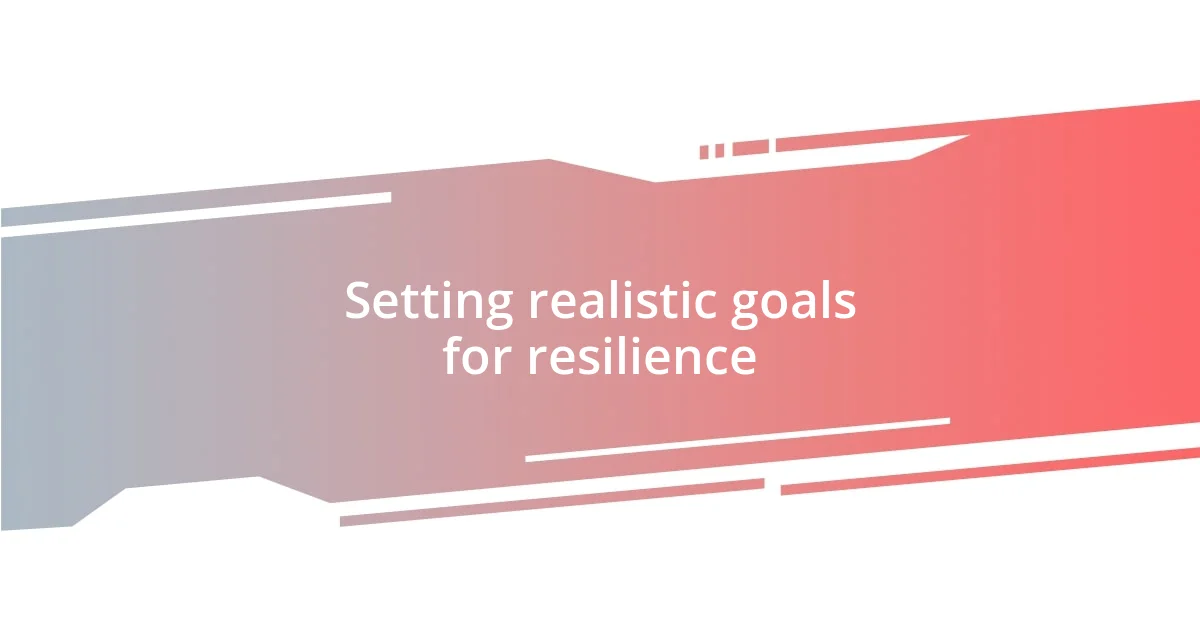
Setting realistic goals for resilience
Setting realistic goals for resilience is essential in navigating life’s ups and downs. I remember when I decided to step back and assess what I could genuinely achieve in a challenging period. Instead of aiming for monumental changes overnight, I focused on small, actionable goals—like setting aside fifteen minutes each day for reflection. Have you ever found that achievable steps help you feel more in control during turbulent times?
Sometimes, it’s tempting to set lofty aspirations, thinking that they will fast-track my resilience. However, I learned that each small victory fuels my confidence. For instance, aiming to drink more water daily may seem minor, but it has a cascading effect on my overall well-being and mental clarity. What small goals have you set that made a big difference in your life?
It’s important to celebrate these incremental achievements. Each time I reach a goal, no matter how small, I feel a surge of motivation. I often ask myself, how can we cultivate that sense of accomplishment to build our resilience further? Looking back, I realize that embracing a series of tiny milestones has reshaped my perspective on resilience, allowing me to adapt and thrive, rather than just survive.










